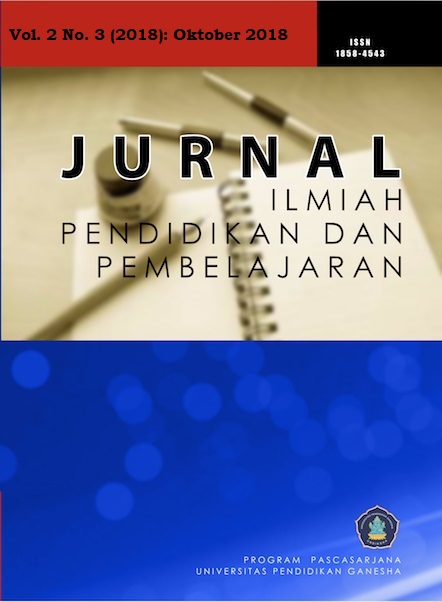KEEFEKTIFAN MODEL PROBLEM BASED LEARNING TERHADAP HASIL BELAJAR TEMA INDAHNYA KEBERSAMAAN SUBTEMA 1
DOI:
https://doi.org/10.23887/jipp.v2i3.16234Abstrak
The Effectiveness of Problem Based Learning Model on Learning on Learning Outcomes of The Theme of “Indahnya Kebersamaan” in Sub-Theme 1 of Fourth Grade Students of SDN Pandean Lamper 03 Semarang. The purpose of this study was to determine the effectiveness of the use of Problem Based Learning model on Learning on Learning Outcomes of The Theme of “Indahnya Kebersamaan” in Sub-Theme 1 of Fourth Grade Students of SDN Pandean Lamper 03 Semarang. The method of the research is quantitative research in Pre Experiment Design with One-Group Pretest-Posttest Design. The technique used is Nonprobability Sampling in the saturated sampling form. The results of research data analysis after getting treatment using the Problem Based Learning model obtained 39 students who completed with a percentage of 90.70% and 4 students who have not finished with a percentage of 9.30%. Calculation of the value of learning outcomes at the average value of posttest> pretest is 82.79> 54.77. This is evident in the final analysis using the t test known that the results of tcount> t table are 24.27> 1.53 at a significant tariff of 5%. The average value of students' attitudes and skills also increases using the Problem Based Learning model. From the analysis, it can be concluded that the Problem Based Learning learning model is effective on the learning outcomes of the theme of Indahnya Kebersamaan in Sub-Theme 1 of Fourth Grade Students of SDN Pandean Lamper 03 Semarang. Keywords: Problem Based Learning Model, learning outcomesReferensi
A.Y. Soegeng Ysh, S. T. (2009). Pengantar Ilmu Pendidikan. Semarang: FIP IKIP PGRI SEMARANG.
Sugiyono, 2014. Metode Penelitian Kuantitatif, Kualitatif, dan R&D. Bandung: ALFABETA.
Departemen Pendidikan Nasional, 2003 Undang-Undang Nomor 20 Tahun 2003, tentang Sistem Pendidikan Nasional, Jakarta: Depdiknas.
Sugiyono, 2017. Metode Penelitian Pendidikan (pendekatan Kuantitatif, Kualitatif, dan R&D). Bandung :Alfabeta.
Jumanta Hamdayama, S. M. (2014). Model dan Metode Pembelajaran Kreatif dan Berkarakter. Jakarta: Ghalia Indonesia.
Abdurrozak Rizal, dkk. 2016. Pengaruh Model Problem Based Learning Terhadap Kemampuan Berpikir Kreatif Siswa.Jurnal Pena Ilmiah: Vol. 1, No, 1.
Gunantara, Md, dkk. 2014. Penerapan Model Pembelajaran Problem Based Learning untuk Meningkatkan Kemampuan Pemecahan Masalah Matematika Siswa Kelas V(online). Jurnal Mimbar PGSD Universitas Pendidikan Ganesha (Vol:2 No:1) diakses di laman http://ejournal. undiksha.ac.id/index. php/JJPGS /article/ view /2058/1795.
A.Y. Soegeng Ysh, S. T. (2017). Filsafat Pendidikan. Yogyakarta : Magnum Pustaka Utama.
Rusman. 2014. Model-Model Pembelajaran. Jakarta: Rajawali Pers.
Nafiah Yunin Nurun, dkk. 2014. Penerapan Model Problem-Based Learning untuk Meningkatkan Keterampilan Berpikir Kritis dan Hasil Belajar Siswa. Jurnal Pendidikan Vokasi (Vol : 4, Nomor : 1) diakses di laman https://journal.uny.ac.id/index.php/jpv/article/viewFile/2540/2098.
Rusman. 2014. Model-Model Pembelajaran. Jakarta: Rajawali Pers.
Shoimin, Aris. 2014. 68 Model Pembelajaran Inovatif dalam Kurikulum 2013. Yogyakarta: Ar-Ruzz Media.
Sugiyono, 2014. Metode Penelitian Kuantitatif, Kualitatif, dan R&D. Bandung: ALFABETA.
Sugiyono, 2017. Metode Penelitian Pendidikan (Pendekatan Kuantitatif, Kualitatif, dan R&D). Bandung : Alfabeta.
Susanto. 2013. Teori Belajar dan Pembelajaran di Sekolah Dasar. Jakarta: Prenada Media Group
Wardoyo, Sigit Mangun. 2015. Pembelajaran Konstruktivisme: Teori dan Aplikasi Pembelajaran dalam Pembentukan Karakter. Bandung: Alfabeta.
Unduhan
Diterbitkan
Cara Mengutip
Terbitan
Bagian
Lisensi
Authors who publish with the Jurnal Ilmiah Pendidikan dan Pembelajaran (JIPP) agree to the following terms:
- Authors retain copyright and grant the journal the right of first publication with the work simultaneously licensed under a Creative Commons Attribution License (CC BY-SA 4.0) that allows others to share the work with an acknowledgment of the work's authorship and initial publication in this journal.
- Authors are able to enter into separate, additional contractual arrangements for the non-exclusive distribution of the journal's published version of the work (e.g., post it to an institutional repository or publish it in a book), with an acknowledgment of its initial publication in this journal.
- Authors are permitted and encouraged to post their work online (e.g., in institutional repositories or on their website) prior to and during the submission process, as it can lead to productive exchanges, as well as earlier and greater citation of published work. (See The Effect of Open Access)










